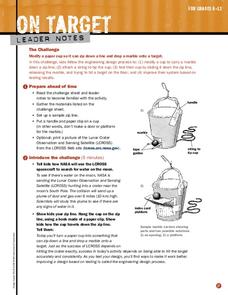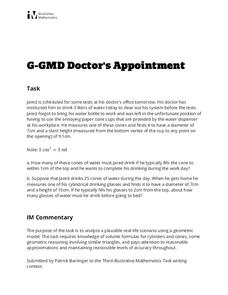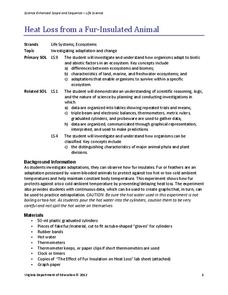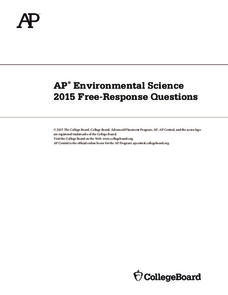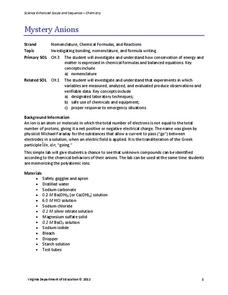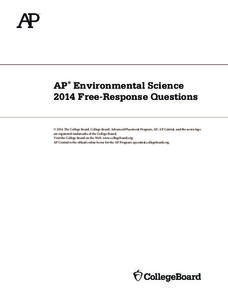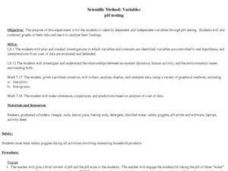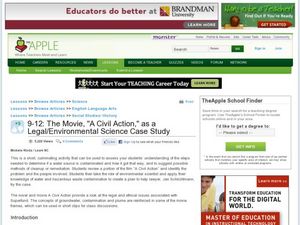Omaha Zoo
Monitoring Amphibians
What sort of shoes do frogs wear? Open toad sandals. If your scholars want experience collecting field samples, this is the lesson for you. After learning the proper way to collect field samples, pupils catch amphibians to test for...
PhET
Reactants, Products and Leftovers
Did you know when you mix the reactants sulfur, tungsten, and silver, you get the products SWAg? The simulation begins with making sandwiches, to show pupils reactants and products of something familiar. They then can make water,...
NASA
On Target
NASA's LCROSS mission is dropping a probe into a lunar crater. Groups design a system to travel down a zip line and drop a marble onto a target in the classroom. The groups then modify their designs based upon testing.
Illustrative Mathematics
Doctor's Appointment
Geometric volume calculations are brought into the real world in a quick set of application problems. Learners are asked to help a patient figure out how to drink a prescribed amount of water both at work and at home. This activity...
Virginia Department of Education
Changes in Ecosystems
How does water pollution affect the environment? Provide your class with the resources to answer this question as they learn about eutrophication and ecosystem changes. Over two weeks, they simulate the effects of pollution on the...
DiscoverE
Working with Watermills
Water is a powerful force; harness it through watermills. The task at hand is to create a simple watermill that functions in flowing water for at least three minutes. Scholars work together in teams to design and construct such a...
Virginia Department of Education
Heat Loss from a Fur-Insulated Animal
How do animals adapt to weather changes? Provide your class with the ability to understand adaptations and body temperature as they participate in this hands on experiment, using fake fur and hot water. Pupils collect data and...
College Board
2015 AP® Environmental Science Free-Response Questions
Less than eight percent of AP Environmental Science test takers earn the highest score possible. Help scholars improve their scores by using actual test questions on water quality and urban planning before reading sample responses that...
Institute of Electrical and Electronics Engineers
Fun with Speedboats!
After reading about marine engineers and naval architects, it's all hands on deck to design and test a speed boat. This lesson is designed for the Next Generation Science Standards in engineering and can be a centerpiece for a STEM...
Virginia Department of Education
Mystery Anions
Lost an electron? You should keep an ion them. Young chemists learn qualitative analysis in the second lesson of an 11-part chemistry series. After observing reactions of simple salts, the teacher provides pupils with unknown...
Learning Games Lab
Nitrogen in Pollutants
Responsible farming is important for maintaining natural resources. Eager scientists complete a WebQuest to explore what happens to nitrogen when it enters the soil. They learn about the chemical makeup of nitrogen-based molecules...
Teach Engineering
Dress for Success
Dressing for success is not always about looking sharp. Sometimes it is about staying warm and dry. Present your class with an activity that challenges groups of pupils to design a layered material for blizzard conditions. The teams test...
College Board
2017 AP® Environmental Science Free-Response Questions
Almost half of test takers passed the AP Environmental Science exam in 2017. Use the free-response questions on the topics of pollution and ecosystems to improve writing skills in preparation for the AP exam. Discuss the scoring...
College Board
2014 AP® Environmental Science Free-Response Questions
Less than half of AP Environmental Science test takers pass each year. The College Board releases previous test questions covering topics from greenhouse gases to ecological succession to help scholars prepare for future assessments. Use...
Curated OER
The Water in Our Lives: Kit Practice
Students examine a local water source using testing kits to determine water qualitiy. They identify the pollutants and contaminants in each sample. They determine if samples fall within an acceptable range for drinking water.
Curated OER
Great Lakes Ecology
Students are able to use a secchi disk to measure the turbidity of water by determining the depth at which the sechi disk is no longer visible and using the data in a formula to quantify the results. They are able to use Vernier probes...
Curated OER
Testing for Conductivity
Students test the conductivity of selected liquids and solids. They test the circuit by touching the two free ends of the wires together and add salt little by little recording the data after each addition. Finally, students predict...
Curated OER
pH Testing
Young scholars explore the use of variables in the scientific method. They identify the dependent and independent variables through pH testing. Students construct graphs of their data and analyze their findings.
Curated OER
Water Quality
Students play the role of scientists testing for water quality in the area. In this ecology lesson, students determine the water sample's pH, temperature, dissolved oxygen and turbidity. They write a journal reflection after the activity.
Concord Consortium
Diffusion of a Drop
Trying to learn through diffusion rather than simply studying the material rarely works for scholars. This simulation helps make learning diffusion fun. Pupils add a drop of dye to water and observe the diffusion as the molecules bounce...
Curated OER
Molecular Movement in Water Part 1- Diffusion
High schoolers obseve and compare molecular movement within water at various temperatures and of varying salinity. They discuss the movement of water on a larger scale which can affect the movement and concentrations of microbial...
Curated OER
The Human Organism
In this digestion and nutrition lesson plan, 3rd graders test foods to find their vitamin content. Students test for starch and fats then compare their findings on charts and oral reports. The lesson plan concludes with a teacher...
Curated OER
9-12: The Movie, "A Civil Action," as a Legal/Environmental Science Case Study
Students analyze information to determine how they can help a community that has been affected by water contamination. For this environmental science lesson, students watch portions of the movie "A Civil Action" and discuss...
American Chemical Society
Using Chemical Change to Identify an Unknown
If you discover an unknown powder, how do you determine if it is safe? Lesson uses four different tests to identify the properties of various powders that appear the same. Then scholars get an unknown powder and have to determine which...




